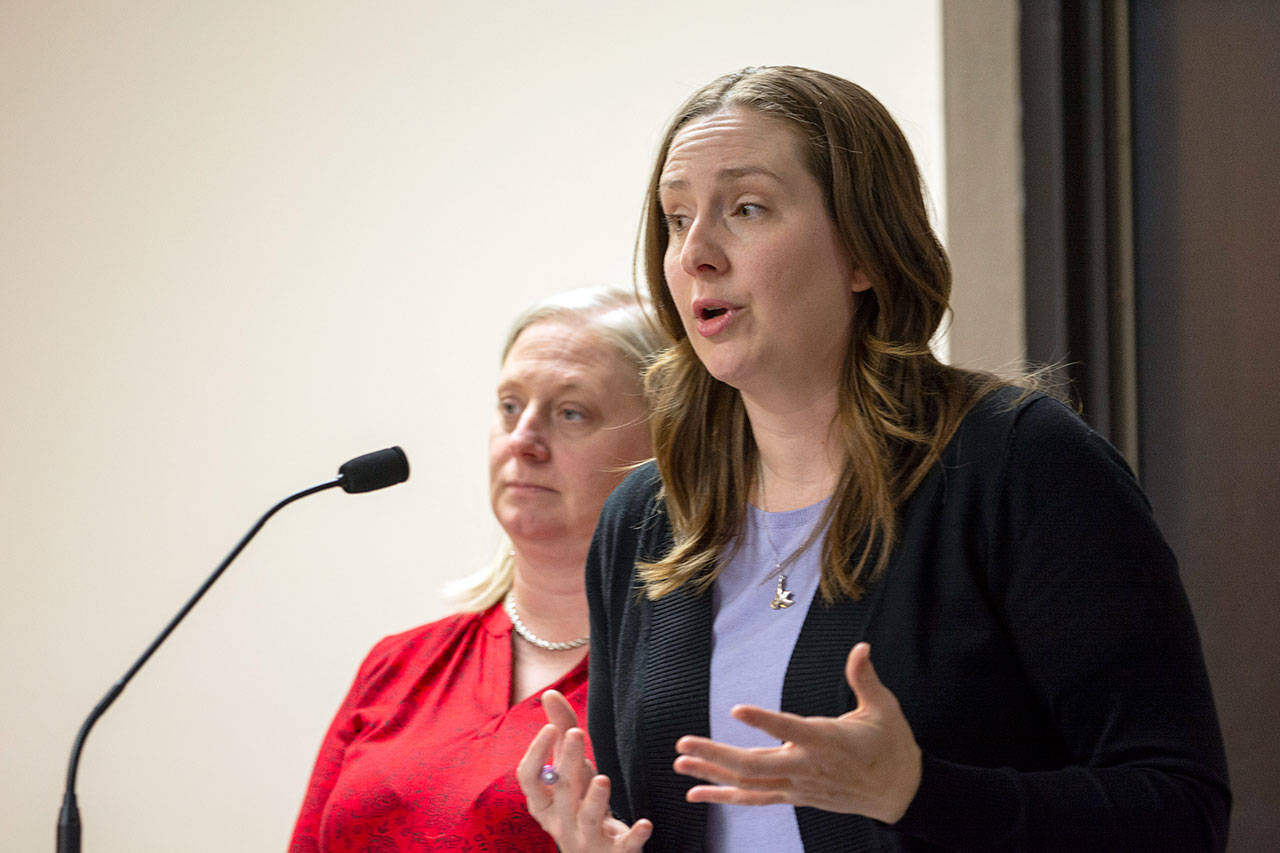PORT ANGELES — A change in how Medicaid funds are disbursed has created a $1.5 million shortfall in Clallam, Jefferson and Kitsap counties for crisis and diversion programs that help people with mental health issues.
Officials with Peninsula Behavioral Health and the Salish Behavioral Health Organization told state legislators representing the North Olympic Peninsula during a Clallam County Board of Health meeting Thursday that the change prevents some people with severe mental health issues from accessing the help they need.
Stephanie Lewis, regional administrator for the Salish Behavioral Health Behavioral Organization, told state Reps. Steve Tharinger, Mike Chapman and Sen. Kevin Van De Wege — all of the 26th Legislative District — that the transition to “fully integrated managed care” has resulted in a $1.5 million reduction in behavioral health funding in the region.
“This systemic change to integrated managed care is only being implemented for Medicaid enrollees, whereas previously behavioral health services in our state were managed through behavioral health organizations and Medicaid enrollees and low-income uninsured individuals were all managed through behavioral health organizations,” she said.
“That leaves a notable gap for the non-Medicaid and uninsured population.”
The Salish Behavioral Health Organization is transforming into the Salish Behavioral Health Administrative Services Organization at the end of the year and will be responsible for the regional crisis system, limited non-crisis behavioral health services for people at or below 220 percent of the federal poverty level and for jail transition services.
This change has resulted in an 80 percent reduction in funding for mental health residential treatment, such as PBH’s Arlene Engel House in Port Angeles, for non-Medicaid individuals said PBH Executive Director Wendy Sisk.
Sisk said this becomes a problem because many of the people seen by PBH are covered by Medicare, though Medicare doesn’t pay for many of the services being provided.
At the Arlene Engel House, PBH cares for seven people who are not covered by Medicaid and who became qualified for Medicare because they became disabled early in life.
“We have seven people and we now have funding to serve one,” Sisk said. “These are individuals who, in most states, would live in psychiatric institutions; people with profound schizophrenia who can not take care of their basic health and safety needs on their own.”
Medicare is a federal program that provides health coverage for seniors and for those under 65 with disabilities. Medicaid is a state and federal program that provides health coverage for those with very low income.
Sisk said that typically PBH serves about 150 people in the community who are either on Medicare or are unable to access Medicaid for various reasons.
These people are not qualified for Medicaid because they “earn too much” under Medicare, she said.
She said the new structure of Medicaid now will allow only 31 people across all three counties to be cared for per year.
“This money didn’t necessarily go away, it got transitioned to Medicaid patients,” Sisk said. “That’s a real challenge for us and we’re really looking for the Legislature to help the Health Care Authority move those dollars back to that non-Medicaid population.
“We know if we don’t provide those intensive outpatient services, we’re going to see an increase in psychiatric inpatient costs and we’d rather provide care for people in our community rather than let them get so sick that we can’t care for them anywhere else but the state hospital,” Sisk said.
Tharinger asked Sisk whether PBH has applied for help from Clallam County’s Chemical Dependency / Mental Health fund. It has.
Peninsula Behavioral Health has asked Clallam County for a $176,232 grant to make up this shortfall, according to records obtained in a public records request.
The CM/MH board will meet before making recommendations to the Clallam County Commissioners for funding, but the funds are limited.
“Our county has about $1 million a year and there are a lot of other programs we have made a strong investment in,” Sisk said. “It’s been really hard for counties to come in and fill this gap.”
Clallam County Commissioner told Tharinger that though Clallam County is well positioned to use some of that funding to replace a portion of the shortfall, there is a systemic challenge.
Sisk said that across the region, even after searching for other funding sources, there is likely still about a $1 million shortfall.
“We can expect to see our higher cost services and expenditures go up when we’re not providing this care,” Sisk said. “Emergency Room visits, visits to corrections facilities. That’s concerning.”
________
Reporter Jesse Major can be reached at 360-452-2345, ext. 56250, or at jmajor@peninsuladailynews.com.

